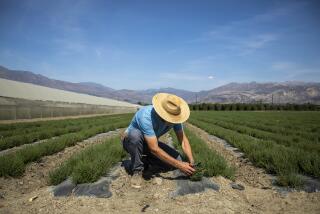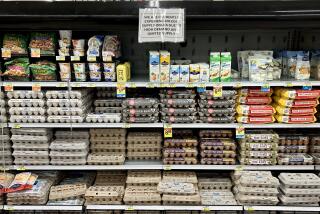Organic Produce for Taste and Conscience
- Share via
Organically grown is not always more expensive, but it usually is.
Instead of pesticides, insecticides and chemical fertilizers, organic farmers rely on crop rotation, composting and other natural methods. These older farming techniques can be more labor-intensive and therefore more costly than the mechanized methods used on many big farms that use chemicals.
Also contributing to the higher cost is the law of supply and demand, according to Harry Najjar, owner of Cream of the Crop natural foods in Oceanside. When more people ask for organically grown produce, more farmers will supply it, and the cost will come down, he said.
Derek Casady remembers when organic tomatoes were selling for $2.49 a pound, while commercially grown tomatoes were going for 89 cents. Yet people were buying the organically grown.
“For a lot of people, it’s their health,” said Nancy Casady. “If they eat something that’s been sprayed, they get sick.”
Tomatoes, for instance, can legally be sprayed with 43 different chemicals, she said. Some people react immediately to such chemicals.
Choosing organically grown or produced products also can be a moral and/or political decision.
Environmentalists argue that the use of synthetically fertilized crops wears out topsoil at a tremendous rate, rendering large amounts of farmland obsolete in a matter of decades, and putting the planet’s food supply in jeopardy.
“You vote with your shopping cart, in support of a sustainable agriculture that can last for centuries,” Casady said.
Last, but not least, there’s the crucial aspect of taste.
“Take a commercially grown tomato,” said Najjar. “It’s got a hormone in it to plump it up a little, maybe some insecticide to keep the bugs off, and some wax on the outside to make it shiny.”
But when you slice a wedge out of such a tomato and bite into it, there’s something missing, Najjar said.
“It doesn’t taste like a tomato, it just looks like a tomato,” he said. “Then try an organically grown tomato. Believe me, you won’t ever buy another commercially grown tomato.”
In California, food products claiming to be organic must state on the label that all ingredients were grown and processed in accordance with the California Organic Foods Act of 1990, or that law’s predecessor, section 26569.11 of the California Health and Safety Code.
Organic farmers must register with the U.S. Department of Agriculture and certify that they have not used synthetic fertilizers or pesticides on their crops for three years.
Most certifications in California are performed by the nonprofit group California Certified Organic Farmers, the largest organization of its kind.
More to Read
Eat your way across L.A.
Get our weekly Tasting Notes newsletter for reviews, news and more.
You may occasionally receive promotional content from the Los Angeles Times.









